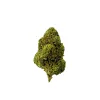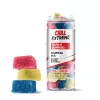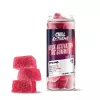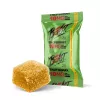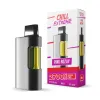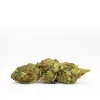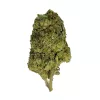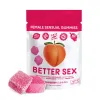Most people already know about the difference between CBD and THC—two of the most famous compounds found in cannabis. That said, the hemp world has much more to offer than just this power couple. From HHC to CBG, cannabis has dozens of compounds ready and able to make your life better in ways you can’t even imagine!
One of these often-overlooked compounds is THCA, an inactive compound that’s actually a key player in how high weed makes you. But how is this possible? And with a name so similar to THC, is THCA anything like it? If you’ve been itching to learn a little more about THCA, welcome! We’ve got lots to talk about.
What is THCA?
THCA, short for tetrahydrocannabinol acid, is a non-psychoactive cannabinoid present in raw and unheated cannabis plants. THCA is the acidic form of THC, but unlike THC, it does not produce a high. Both cannabinoids have similar chemical structures with different functions.
THCA stems from CBGA, also known as the “mother of all cannabinoids” or the “mother cannabinoid,” which develops as the cannabis plant matures. Because THCA has an extra molecular carboxyl ring, the cannabinoid is not able to bind to the brain’s receptors to create the euphoric high associated with THC.
Even though you can’t get high from consuming THCA directly, the compound still affects your experience with weed with its numerous positive health benefits. And of course, THCA’s most important and best-known use is being converted into THC with heat exposure. So, in other words, THCA doesn’t get you high, but it allows for the creation of THC, which is the main psychoactive compound found in cannabis.
WHAT IS THCA? Cannabinoid Profile THCA
THC vs. THCA
So, we already know THCA turns into THC when it’s heated. This occurs in a process known as decarboxylation, which includes an alteration to THCA’s molecular structure, where it loses that extra carboxyl ring. If you’ve ever made pot brownies or tried your hand at whipping up some cannabutter, you already know that the most crucial step in making edibles is “decarbing” the weed. This process converts THCA into THC, thus rendering your final product psychoactive as opposed to non-psychoactive.
But does every tetrahydrocannabinol stem from THCA?
Delta 8 vs. THCA
Because delta 8 is a tetrahydrocannabinol, it also originates from THCA. Delta 8 THC exists naturally in the hemp plant, but it’s only present in trace amounts. Because of this, scientists have developed a way to create delta 8 from hemp-derived CBD in a lab environment in a process known as isomerization. Because all cannabinoids have the same molecular make up, creating delta 8 from CBD is only a matter of rearranging pre-existing atoms.
The main and most important difference between THCA and delta 8 is that THCA is non-psychoactive, while delta 8 is a moderately mild psychoactive substance. So, if you want a gentle and relaxing high, delta 8 would be a good choice, but if you’re trying to stay away from any psychoactive effects while still receiving the benefits of cannabis, go for THCA.
Delta 9 vs. THCA
Delta 9, also known as delta 9 THC or just THC, is the main psychoactive compound in cannabis plants. THCA can be converted into delta 9 with the application of heat, but apart from that, these are two different compounds.
In essence, THCA is the non-psychotropic, inactive cannabinoid found in raw cannabis, while THC is the active, psychotropic cannabinoid it can create. Scientifically speaking, the difference between the two cannabinoids is that HCA has an additional carboxyl group that makes it unable to bind to CB1 receptors, thus rendering it non-psychoactive. When that carboxyl group is removed via decarboxylation, however, we’re left with delta 9, which is most certainly psychoactive.
Delta 10 vs. THCA
Similar to delta 8, delta 10 is another mildly psychoactive tetrahydrocannabinol, meaning it can also be derived from THCA. That said, the compound is even milder than delta 8, but it has more energizing and invigorating effects. Again, the main difference between delta 10 and THCA is that THCA is not psychoactive, but delta 10 is—albeit to a very mild extent. With delta 10, you’ll feel creative, focused, and energized, while also experiencing and understated and extremely manageable high. With THCA, you will feel no psychoactive effects at all.
Will THCA Get You High?
As previously mentioned, THCA is considered non-psychoactive, meaning consuming THCA will not get you high. THCA does not bind to CB1 receptors—or any other major cannabinoid receptors—for that matter, according to a study on the compound’s affinity and efficacy to cannabinoid receptors.
THCA needs to be heated up and decarboxylated to convert to THC, which is what makes cannabis psychoactive in the first place. THCA’s natural non-psychoactive state is the reason eating or ingesting raw cannabis in any other way does not result in a high.
So, in conclusion, no, THCA does not get you high.
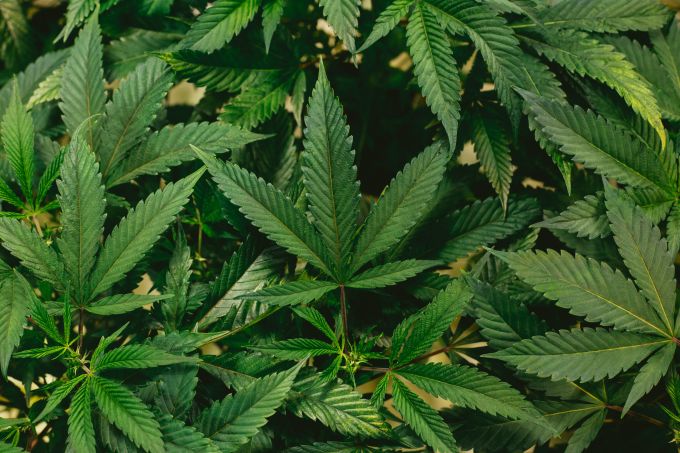
What Are the Effects & Benefits of THCA?
We’ve already mentioned that one study found THCA to be unsuccessful in binding to cannabinoid receptors in the body, thus why it does not make us high. But what else is there to this mysterious and exciting cannabinoid?
A study published to the British Journal of Pharmacology in 2013 explored the effects of non-THC cannabinoids on prostate carcinoma growth. THCA, among other compounds like CBD, CBG, and CBDA, was “assessed against a number of tumor cell lines distinct in origin and typology.” The study indicated that these compounds “were usually the more effective inhibitors of cancer cell growth, with little or no activity on non-cancer cells.”
Another study, also published to the British Journal of Pharmacology that same year, studied THCA’s anti-emetic and anti-nausea properties, finding that THCA “may be a more potent alternative to THC in the treatment of nausea and vomiting.”
Various other studies have suggested that THCA is an effective neuroprotectant. These potential protective effects are due to the activation of the PPARγ receptor. The compound is thought effective in helping protect against the progression of neurodegenerative diseases such as multiple sclerosis, Parkinson’s disease, and Alzheimer’s disease. An additional study on THCA’s interactions with PPARγ receptors found that the cannabinoid has been shown to reduce the production of inflammatory makers and regulate inflammation pathways, helping to reduce inflammation and pain in preclinical studies.
In 2020, a study published in the National Library of Medicine observed THCA’s effects on metabolic disease caused by diet-induced obesity in mice. Researchers demonstrated THCA’s apparent ability to reduce obesity and associated diseases including diabetes and fatty liver disease.
While there currently exists some promising research on THCA, the scientific world has long to go before we are able to fully understand the compound’s entire spectrum of benefits. For now, however, THCA has been found to have many potential benefits, including:
- Anti-proliferative (anti-cancer)
- Antiemetic (anti-nausea)
- Neuroprotective
- Anti-inflammatory
- Anti-obesity
There have been no notable side effects observed with the consumption of THCA to date. Some speculate that THCA may turn into THC in the digestive tract and cause psychoactive effects, but even if that is the case, the amount of THC produced, and its subsequent effects, will more than likely be negligible.
How Long Does THCA Stay in Your System?
Determining how long THCA stays in your system is a little tricky. Because THCA is usually ingested after decarboxylation, it enters the body as THC. Once converted into THC, the psychoactive version of the acid is detectable for up to 90 days in hair, between 1 day to upwards of a month in urine, up to 24 hours in saliva, and up to 12 hours in blood.
It is unclear how long THCA stays in your system if consumed raw, but some research suggests that the compound may still trigger a positive drug test result due to the way cannabinoids are metabolized by the body.
Does THCA Show Up on a Drug Test?
Although THCA is non-psychoactive, it could still potentially trigger a positive drug test result. The preferred method for cannabis drug testing is urine screening, which works in one of two ways. The first is the Immunoassay (IA) test, which is a quick testing strategy that checks for any macromolecule in a tested sample. Although IA tests are cheaper and quicker, they often produce inaccurate results. The second is the Gas Chromatography-Mass Spectrometry, which vaporizes the tested sample and separates it into various components before being fragmented for more accurate results.
Today’s drug tests aren’t advanced enough to differentiate one cannabinoid from another because all tetrahydrocannabinols end up as THC-COOH, a metabolite drug tests actively search for. According to Ronald Flegel from the Substance Abuse and Mental Health Services Administration, “The marijuana analyte tested in urine is tetrahydrocannabinol-carboxylic acid (THCA).” This means that although it isn't psychoactive, consuming THCA or raw cannabis material containing THCA may still trigger a positive test result.
As a matter of fact, a study published in 2015 sought to prove that the presence of cannabinoids in hair does not prove cannabis consumption. Researchers gave participants 50 milligrams of THCA every day for one month. No THC was found in the hair specimen samples, but THC-COOH was still detected.
So, even though THCA is non-psychoactive and technically federally legal (more on that later), the compound still has the potential to trigger a positive result on a drug test despite the absence of thermal conversion to THC. If you know you have a drug test coming up, it’s best to steer clear from any cannabis compound for a few weeks before the test. Sure, you can explain THCA’s nature to your boss—or hell, even send them this article—but at the end of the day, it’s better to be safe than sorry.
Can You Build Up Tolerance to THCA?
There is currently no research suggesting that users can build up a tolerance to the potential benefits of THCA, including its anti-inflammation, antiemetic, or neuroprotective properties. That said, you can certainly build a tolerance to THC, which results from THCA being decarboxylated.
Unfortunately, many cannabis users eventually build up a tolerance to THC from extended use. This can result in a reduction in how much you enjoy using THC products. You may feel like a specific amount of cannabis no longer causes the psychoactive effects it once did, or you may find yourself dissatisfied with the amount of baggies you run through in a specific amount of time.
When this happens, you’re in need of a tolerance break, or a “T” break. If you feel like you’re building up a tolerance to cannabis, not using the substance as frequently can decrease your tolerance over time. You can choose to take a break for a couple days or a couple weeks, but the longer you wait to use it again, the lower your tolerance will become.
THCA has no psychoactive effects to begin with, so it’s not like introducing the compound to your daily routine will lessen its perceived effects over time. That said, the fact that no research proves you can build a tolerance to THCA does not mean you can’t. If you feel like THCA isn't hitting the way it used to, take a break for a couple days and see how you feel once you come back to it.
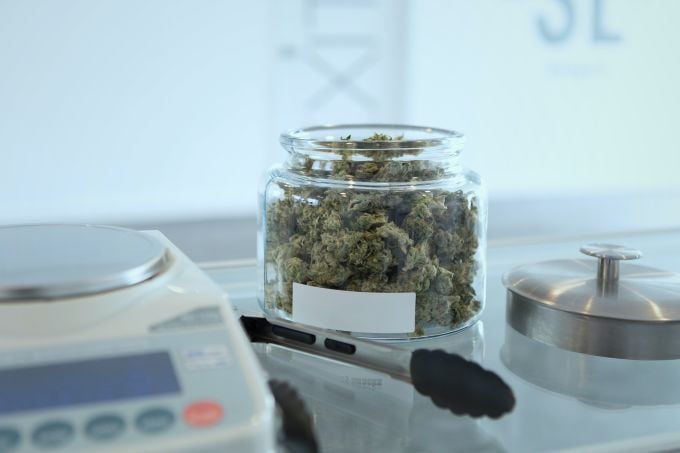
Is THCA Safe?
The general consensus regarding THCA is that it is relatively safe and has no potential to cause addiction due to its non-psychoactive nature. Nevertheless, going overboard with any natural compound can lead to an unpleasant experience and an array of side effects, including dizziness, restlessness, and diarrhea. Additionally, some user reports indicate that THCA could cause anxiety at higher doses, so even though the compound won't get you high, it’s still best to exercise restraint when using the cannabinoid.
Moreover, the most important safety factor when it comes to any cannabinoid is obtaining it from a trustworthy and reputable source. Some stores sell THCA flower, pre-rolls, tinctures, edibles, capsules, topicals, and more, but before determining which product is right for you, you need to first figure out which company you trust to deliver the safest and highest-quality product available.
As long as THCA is sourced from organic plant material and tested for contaminants or impurities, the compound will not have any negative effects on your health or safety.
How to Properly Dose THCA
THCA is certainly a cannabinoid worth exploring, especially due to its potential benefits. Some studies have shown that THCA can have significant health benefits at lower doses than other cannabinoids, meaning that consumers can use less of the product while also getting more relief. Some sources have shown that THCA dosage should be 10 to 100 times lower than the required THC dosage. Other preclinical studies have shown that THCA can be up to 10 times more potent when used as a full spectrum extract as opposed to an isolate.
That said, the research on THCA and how to dose it remains in its infancy, meaning we don’t yet have exact guidelines on how much—or how little—to take.
Like with other cannabinoids, however, it’s best to follow this rule of thumb when taking THCA: start low and slow and build your way up to a dosage that feels comfortable for you. If you buy a THCA product, it will likely come with instructions on how to use it. Follow the dosages on your product packages, or even better, start a little lower than the recommended amount.
Remember, dosing cannabinoids is never an exact science because it depends on several factors like weight, age, metabolism, and tolerance, so only you know what your perfect dosage is.
Smoking, Dabbing, or Gummies for THCA?
There are many THCA products available on today’s hemp market. But choosing a product isn't only about your preference between vaping, eating, or dropping THCA. Unlike other compounds, THCA behaves extremely differently depending on how you take it—your product of choice can determine the difference between a psychoactive and non-psychoactive experience.
Heating THCA, whether by smoking it, dabbing it, or cooking it, will lead to its conversion from THCA to THC, a psychoactive compound that will effectively get you high. So, while you can smoke, dab, or eat THCA, all of these methods will lead to you actually ingesting THC, not THCA. If what you want is a powerful stone, go ahead and light it up, but if you’re interested in THCA purely for its non-psychoactive benefits, here are a few methods of administering THCA that require no heat (and will therefore cause no buzz):
- Juicing: Just like any fruit or vegetable, you can simply juice your raw cannabis leaves and blend them into a drink or smoothie. This method allows you to extract the maximum amount of THCA. Some people like to make a large batch and freeze it, which gives you the option to defrost chunks of it and use them at your convenience.
- Tinctures: Raw cannabis tinctures contain high levels of THCA. These tinctures are much easier to deal with than juicing; not only do they require less work, they’re also easier to accurately dose.
- Transdermal Patches: Like nicotine patches, transdermal THCA patches adhere to any veinous parts of the skin and stay on for 8 to 12 hours. This is an easy, hassle-free way to get your dose of THCA for a prolonged period of time.
- Pre-Made Edibles: THCA edibles are currently available on the market, but we recommend doing your research, buying from a trusted brand, and ensuring that each product comes with third-party lab test results. Because cannabis is usually decarboxylated when added to edibles, you need to make sure that your THCA edibles have not been heated up in the slightest, or else you risk exposure to THC and its psychoactive effects.
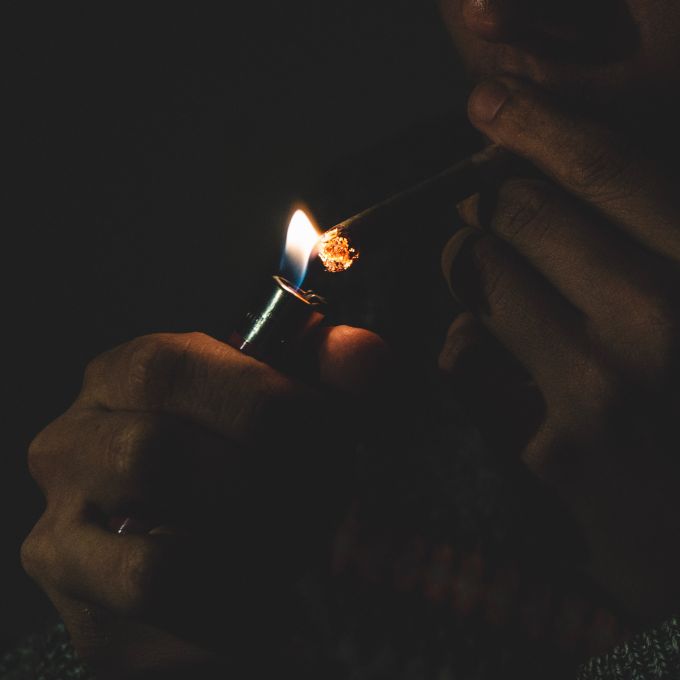
Is THCA Legal?
THCA’s legality is a complicated subject, to say the least. THCA has not been classified as a controlled substance at the federal level. Possessing THCA, however, could land you in some legal trouble if you decarb raw cannabis. Once THCA has been decarbed, it becomes THC, the main psychoactive compound in cannabis that remains illegal at the federal level. It is also possible that the DEA could consider THCA an analog of THC and press charges based on the Federal Analog Act.
Another important legal document that comes into play regarding THCA’s legality is the Farm Bill. Passed in 2018 and also known as the Agriculture Improvement Act, the Farm Bill distinguishes legal hemp from illegal marijuana by its reference to each plant’s delta 9 contents. More specifically, hemp refers to cannabis containing 0.3% THC or less and is legal, while marijuana refers to cannabis containing more than 0.3% THC and remains federally illegal.
This means that, federally, a bud with 25% THCA and only 0.25% THC technically qualifies as hemp under the Farm Bill and is therefore also legal. That said, some states have taken measures to restrict or flat-out ban hemp-derived cannabinoids despite the federal government’s ruling. And some other states have come up with their own medical and recreational cannabis laws that don’t follow the federal government’s stance on marijuana. So, in summary, legality gets complicated at the state level.
While THCA flower is totally legal in some states, such as North Carolina, which doesn’t currently follow any “total THC” standard for hemp in any of its regulations, THCA flower is restricted in other states, such as Oregon, which uses a “total THC” standard for hemp. In states like Pennsylvania, where permitted hemp processors may only use cannabis material that passes a total THC test, determining whether THCA is legal or not can get a little trickier, since retailers of finished hemp products are not required to have a hemp permit, and therefore the total THC requirement does not apply to them.
Although THCA appears to be completely legal when it comes from hemp containing less than 0.3% THC, and dubiously lawful when it comes from marijuana, determining where THCA stands under state laws is much more complicated than understanding the federal government’s blanket legality. This can lead to confusion and misunderstanding of hemp laws at a state level, so we encourage you to do some research of your own in order to better understand where your state stands on this compound.
Final Thoughts
So, what is THCA? It is perhaps most commonly known as the inactive precursor to THC, but the compound itself has a lot more to offer than the potential to become psychoactive. According to some studies, THCA has proven promising in many scientific areas, including anti-inflammation, neuroprotection, anti-obesity, and much more.
When taking THCA, it’s important to understand that any form of heating will effectively convert the compound into THC, which will get you high despite THCA’s original non-psychoactive state. If your goal is to create THCA into a psychoactive compound, feel free to use heat in order to convert it into THC. If what you want are its non-psychoactive effects, however, be sure that the compound stays far away from any source of heat (including the sun).
And there you have it! A full, comprehensive guide on THCA’s wonderful and at times confusing nature. Now equipped with this information, we hope you’re ready to make good choices about your cannabinoid products.


